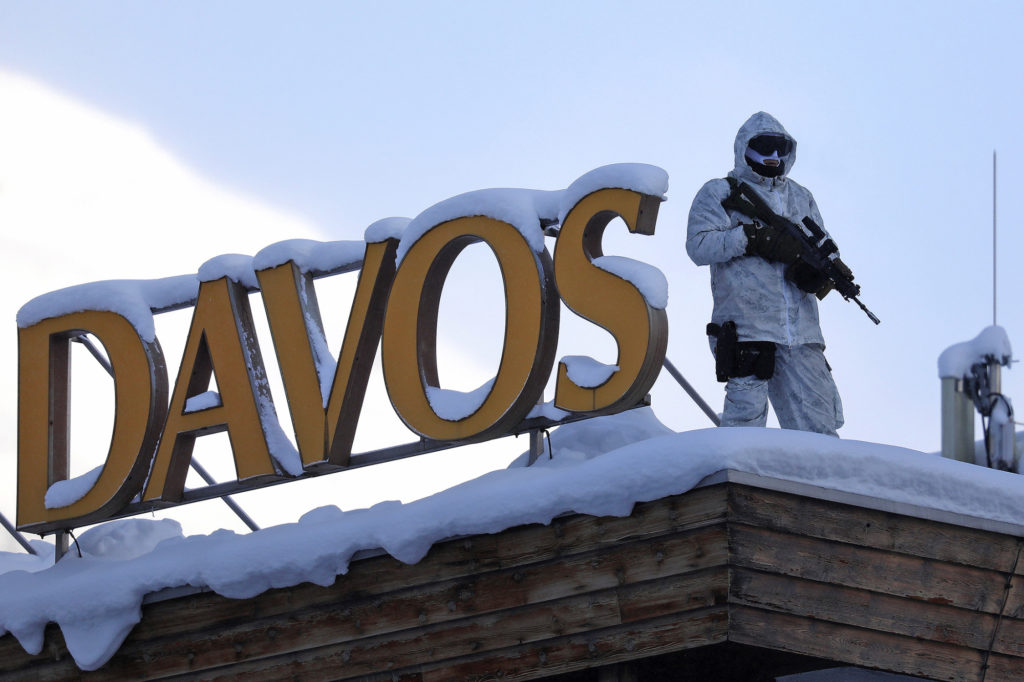By Kitty Testa
What is Davos?
Fifty weeks out of the year Davos is a ski resort town in Switzerland with a population of just over 11,000, but for several days every year it is the center of economic globalism when it hosts the World Economic Forum (WEF) annual meeting. When you see a headline about Davos, they’re probably referring to the latter.
Each year, financiers, high-ranking elected officials, economists, and the heads of global institutions like the World Bank and the International Monetary Fund gather in Davos to discuss the world’s economy and to promote policies to make it the way they want it to be.
In some ways it’s a networking event for the rich and powerful. It is a place to see others and be seen, an entrée into the chambers of power. The forum also is known for big business drama, such as who is in attendance and who’s making deals with whom. But its mission is to shape global policy. Its attendees are influential—very influential on economic policies in nearly all countries in the world.
The WEF may, in fact, illustrate everything wrong with the modern approach to globalism, an approach that makes globalism repulsive to many, and has helped give rise to the nationalism and populism that is growing around the globe.
So here’s what you need to know about Davos 2017:
1. You Weren’t Invited
Davos is illustrative of the chasm between the economic realities of people, localities and markets and the grand design of a group of borderless elites who believe that they can shape economic conditions to increase wealth and profitability across the globe. This is not an inference, as you can see from their own literature:
The World Economic Forum Annual Meeting in Davos-Klosters remains the foremost creative force for engaging the world’s top leaders in collaborative activities to shape the global, regional and industry agendas at the beginning of each year. For over four decades, the World Economic Forum’s mission – improving the state of the world – has driven the design and development of the Annual Meeting programme.
Unlike libertarian views on global free markets, the folks attending Davos see markets and economies as malleable and controllable. The annual conference will undoubtedly spur government programs and policies across the globe that are intended to interfere with true free markets to achieve ends approved by consensus of Davos attendees. These programs and policies will ultimately affect your behavior in the marketplace. It’s a little like taxation without representation—it directly concerns you, but your input is unwelcome.
2. They Struggle With Spontaneous Order
When economists speak of spontaneous order, they refer to naturally arising order that comes from free markets. In these free markets, free individuals, trading in self-interest, create a mutually beneficial order that facilitates market activity. One example of this is the invention of money to replace barter, or Bitcoin to supplant government-issued currencies.
Because the WEF seeks to command and control economies, it is constantly at loggerheads with spontaneous order. As most elite economists favor the manipulations of Keynesian economic theory, the folks attending Davos look at world economic developments and aim to craft actions “in the global public interest.” It is a bit of a paradox that an elite group of capitalists eschews the notion that the global public interest will take care of itself if just left alone.
3. They’re Really Bad at Predicting the Future
Because the WEF is hostile to spontaneous order, the organization is very bad at predicting the future. The WEF did not see the rise of populism and nationalism with which they now contend. The creatures of Davos live in a bubble, a feedback loop in which they share the same philosophies and accept the same assumptions without question. A year ago they were quite confident in the integrity of the European Union and that Hillary Clinton would be the next president of the United States. Both Brexit and Trump’s election took them by surprise.
4. They’re Scared
Davos attendees are a bit panicked this year because of the global rise of nationalism and populism, and they aim to do something about it. Matthew Campbell and Simon Kennedy wrote in Bloomberg:
This year’s conference agenda makes clear the degree of anxiety. Sessions include a panel of psychology experts offering thoughts on “cultivating appropriate emotions in a time of nationalist populism.” Another, titled “Squeezed and Angry: How to Fix the Middle Class Crisis,” will star International Monetary Fund chief Christine Lagarde alongside hedge fund billionaire Ray Dalio. Separately, Facebook executive Sheryl Sandberg and Meg Whitman, chief executive officer of Hewlett Packard Enterprise, will try to stoke optimism in a chat about shaping “a positive narrative for the global community.”
The title of their article is Davos Wonders If It’s Part of the Problem. Perhaps one of the best things to come out of the events of 2016 is that the elites of the WEF are forced to engage in some self-reflection.
5. They’ll Be Back Next Year
The Davos forum is drawing to a close, and its attendees will pack up their deals and new contacts and get down to business lobbying governments and industries to cooperate with their grand schemes of global economic governance. The 2018 forum will likely include analyses of Donald Trump’s first year in office, the European elections that take place this year, and other yet-to-be known events that threaten to derail their plans.
While libertarians of all stripes generally support globalism in theory, the practice of manipulating economies and markets on a global scale is, in fact, anti-free market. It might be better for us all of the WEF disbanded, and let the people of the world freely trade in their own self-interest. They might just be impressed at the results of the spontaneous order that arises in the absence of their attempts to impose their own.

